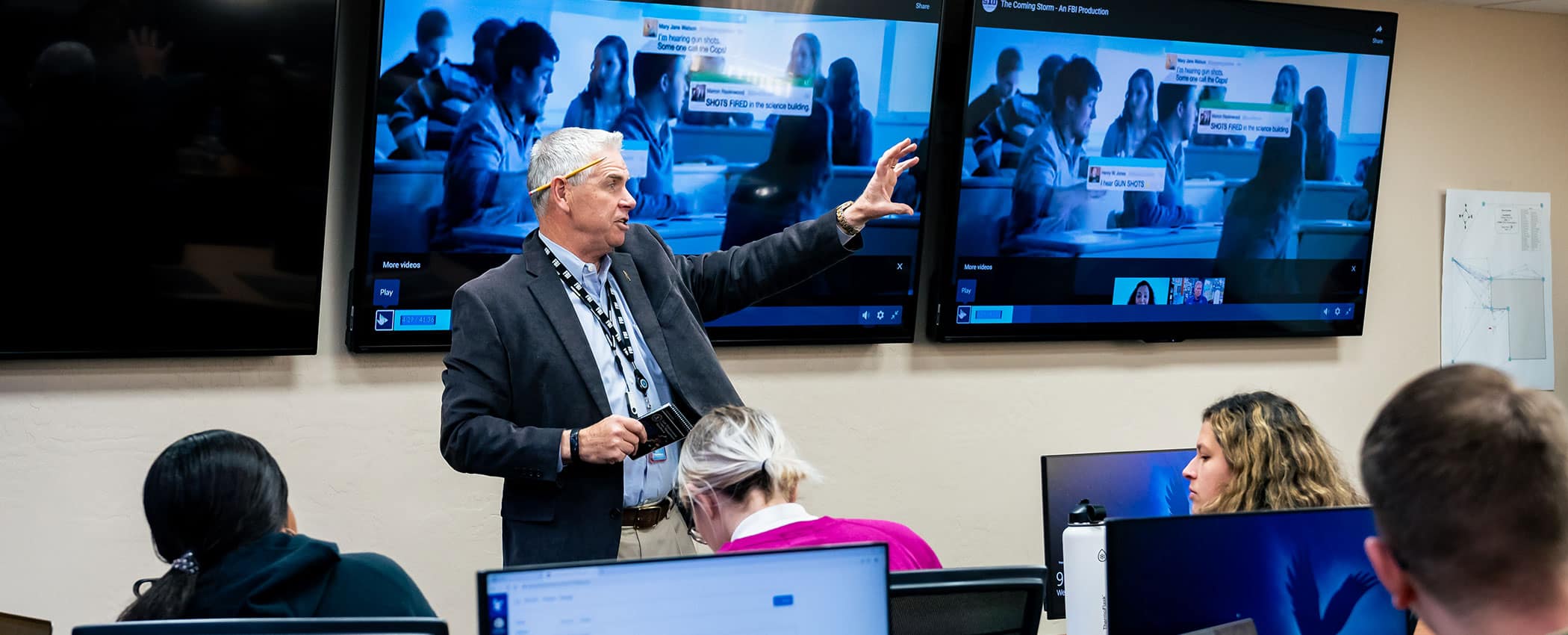
Bachelor of Science in
Homeland Security
The Bachelor of Science in Homeland Security empowers graduates with the knowledge and skills to succeed throughout the homeland security enterprise.
About the Bachelor of Science in Homeland Security
In a world where the security landscape is ever-evolving, the need for skilled professionals in homeland security has never been greater. Natural disasters, the ongoing impacts of climate change, the persistent threat of global terrorism and the complexities of cybersecurity demand a new breed of security expert.
Embry-Riddle, a pioneer in homeland security education, offers one of the nation's first Bachelor of Science in Homeland Security. This program not only provides a solid foundation in security principles but also offers a unique blend of courses in global conflict studies, military science and counterterrorism. It's not just about learning - it's about applying this knowledge to make a real difference.
Student Learning Outcomes
What you will learn while studying for an online homeland security degree:
- Understand the Framework: grasp the intricate legal and policy structure that underpins the homeland security industry
- Protect Critical Infrastructures: develop skills to identify and safeguard essential U.S. infrastructures
- Master Risk Management: employ cutting-edge principles and tools to address homeland security challenges
- Assess Environmental Hazards: analyze the relationship between environmental hazards and U.S. security
Homeland Security Career Opportunities
Careers and Employers
Setting the standard, Embry-Riddle graduates are set to enter the workforce in top companies, including the FBI, CIA, NSA, the Department of Defense and Northrop Grumman, with a placement rate of 90% within a year of graduation.
Graduates with a Homeland Security degree often secure roles as:
- Intelligence Analysts
- Federal Agents
- Information Security Analysts
- Security Supervisors
Homeland Security Salary Information
A degree from Embry-Riddle provides the opportunity for competitive salaries, averaging $88,929 annually, as of 2022.
DETAILS
About Homeland Security at the Worldwide & Online Campus
With the ever-changing needs of the government and its role in protecting its citizens, the online homeland security degree aims to meet those needs as well as the needs of the private sector. Homeland Security students develop highly marketable skills, such as the ability to perform risk analyses, utilize counterterrorism techniques, write emergency management plans and understand how to identify and protect critical infrastructure.
The Worldwide & Online Campus is especially suited for working students, those on the go or students who want to save a bit of money while still living at home.
*Only one capstone course, HLSD 495 - Capstone I, is required. B.S. in Homeland Security to M.S. in Human Security and Resilience. The BSHS to MSHSR program is designed for exceptional students who are committed to continuing their education at the master's level.
Breadth Area/Minors and Certificate
Students can customize their online Homeland Security Degree by either choosing two non-duplicating minors or choosing one minor and a "coherent block of study" from transferred military credits, FAA licenses or approved college credits. The following examples are non-exhaustive but illustrate how students will be able to build invaluable homeland security mission space specializations by selecting focused minors (while several additional minors are available):
- Emergency Management (Emergency Services minor)
- Terrorism Studies (Security and Intelligence minor)
- Military Science (Military Science minor)
- International Relations (International Relations minor)
- Global Conflict Studies (Security and Intelligence minor)
- Cybersecurity (Cybersecurity Application and Management minor)
- Students will earn the FEMA | Emergency Management Institute Professional Development Series (PDS) certificate as part of this program.
Homeland Security Information
- Credits: 120
- Online or In-Person: Fully online
Helpful Links
- Attend a Worldwide Virtual Info Session
- Discover the Department's Faculty
- Explore the Fields of Study: Aviation & Security, Intelligence and Safety
- Find Related Clubs & Organizations
Student Learning Outcomes
Students will:
- Deliver professional presentations and communications based on scholarly research they conduct.
- Engage in all phases of the intelligence cycle, including techniques, strategies, and counter-intelligence concepts.
- Identify information security threats, cybersecurity challenges, and countermeasures.
- Demonstrate mastery of homeland security knowledge and tools.
- Recognize concepts of ethics and professionalism within the homeland security enterprise.
- Interpret the legal and policy structure of the homeland security and intelligence enterprise.
- Evaluate exercises of their design applicable to the disciplines of homeland security.
- Demonstrate knowledge of contemporary or emergent threats, including natural, man-made, and technological hazards.
- Define terrorism, its origins, ideologies, and goals.
- Assess U.S. critical infrastructures using risk-based methodologies and resiliency concepts.
- Apply risk management and analysis principles to homeland security and intelligence issues.
- Analyze environmental hazards and characterize their relationship to U.S. homeland/national security.
- Analyze elements of strategic planning and decision making.
DEGREE REQUIREMENTS
General Education
| General Education | ||
| Embry-Riddle courses in the general education categories of Communication Theory and Skills, and Humanities and Social Sciences may be chosen from those listed below, assuming prerequisites are met. Courses from other institutions are acceptable if they fall into these broad categories and are at the level specified. | ||
| Communication Theory and Skills | 9 | |
| ENGL 123 or equivalent | 3 | |
| ENGL (above ENGL 106) / SPCH / COMD | 6 | |
| Humanities and Social Sciences | 12 | |
| Lower-Level Humanities | 3 | |
| Lower-Level Social Science | 3 | |
| Lower-Level or Upper-Level Humanities or Social Sciences | 3 | |
| Upper-Level Humanities or Social Sciences | 3 | |
| Any Physical and Life Sciences | 6 | |
| Any Mathematics 6-hour sequence above MATH 106 | 6 | |
| Any Computer Science/Information Technology | 3 | |
| Total Credits | 36 | |
Core/Major
| Homeland Security Core** | ||
| HLSD 110 | Introduction to Homeland Security | 3 |
| HLSD 155 | Foundations of Information Security | 3 |
| HLSD 215 | Introduction to Industrial Security | 3 |
| HLSD 280 | Professional Skills in Homeland Security | 3 |
| HLSD 320 | Homeland Security Law and Policy | 3 |
| EMGY 310 | Fundamentals of Emergency Management | 3 |
| HLSD 315 | Critical Infrastructure Security, Resilience, and Risk Analysis | 3 |
| HLSD 360 | Strategic Planning and Decision Making in Homeland Security | 3 |
| SSES 401 | Applied Research Methods in Security and Emergency Services | 3 |
| SCTY 315 | Studies in Intelligence I | 3 |
| or SCTY 385 | Intelligence Collection and Analysis | |
| SCTY 488 | National Security Issues and Terrorism | 3 |
| HLSD 290 | Environmental Security | 3 |
| HLSD 405 | Emergent Topics in Homeland Security | 3 |
| or HLSD 415 | Immigration and Homeland Security | |
| HLSD 410 | Exercise Design and Evaluation in Homeland Security | 3 |
| HLSD 495 | Homeland Security Capstone | 3 |
| Total Credits | 45 | |
Breadth Area or Choose Minors: https://nextcatalog.erau.edu/worldwide/minors/
| Breadth Area/Minors** | ||
| Students complete their breadth requirement by either two non-duplicating minors (minimum 30 credits total), or one minor and a "coherent block of study" from transferred military credits, FAA licenses, or approved college credits (minimum 30 credits total) that is determined with consent of Program Coordinator. | ||
| Total Credits | 30 | |
| Program Support** | 9 | |
| EMGY 400 | Introduction to Incident Command System | 3 |
| EMGY 405 | Disaster Policy and Management | 3 |
| EMGY 430 | Emergency Management and Contingency Planning | 3 |
| **For students in the Bachelor of Science in Homeland Security degree program the RSCH 202 prerequisite for Core, Program Support, or Minor courses are waived since RSCH 202 is not required for the program. | ||
| Total Degree Requirements | (Minimum) 120 | |
Plan of Study (BSHS)
Recommended plan of study and sequence of courses for a four-year degree scenario. A four-year degree plan is not required but serves as an example.
Recommended Plan of Study for a Four-Year Degree Completion Scenario
| Year One | ||
|---|---|---|
| Credits | ||
| ENGL 123 | English Composition | 3 |
| HLSD 110 | Introduction to Homeland Security | 3 |
| Lower-Level Humanities | 3 | |
| Any Mathematics above MATH 106 - Part 1 | 3 | |
| Any Physical and Life Sciences - Part 1 | 3 | |
| ENGL (above ENGL 106)/SPCH/COMD - Part 1 | 3 | |
| HLSD 155 | Foundations of Information Security | 3 |
| Lower-Level Social Science | 3 | |
| Any Mathematics above MATH 106 - Part 2 | 3 | |
| Any Physical and Life Sciences - Part 2 | 3 | |
| Lower-Level or Upper-Level Humanities or Social Sciences | 3 | |
| Credits Subtotal | 33.0 | |
| Year Two | ||
| ENGL (above ENGL 106)/SPCH/COMD - Part 2 | 3 | |
| HLSD 215 | Introduction to Industrial Security | 3 |
| Any Computer Science/Information Technology | 3 | |
| Upper-Level Humanities or Social Science | 3 | |
| Breadth Area/Minor Course 1 | 3 | |
| HLSD 280 | Professional Skills in Homeland Security | 3 |
| SCTY 315 | Studies in Intelligence I | 3 |
or SCTY 385
|
Intelligence Collection and Analysis | |
| HLSD 315 | Critical Infrastructure Security, Resilience, and Risk Analysis | 3 |
| Breadth Area/Minor Course 2 | 3 | |
| Breadth Area/Minor Course 3 | 3 | |
| Credits Subtotal | 30.0 | |
| Year Three | ||
| EMGY 310 | Fundamentals of Emergency Management | 3 |
| HLSD 320 | Homeland Security Law and Policy | 3 |
| HLSD 360 | Strategic Planning and Decision Making in Homeland Security | 3 |
| EMGY 400 | Introduction to Incident Command System | 3 |
| Breadth Area/Minor Course 4 | 3 | |
| SSES 401 | Applied Research Methods in Security and Emergency Services | 3 |
| HLSD 290 | Environmental Security | 3 |
| HLSD 405 | Emergent Topics in Homeland Security | 3 |
or HLSD 415
|
Immigration and Homeland Security | |
| Breadth Area/Minor Course 5 | 3 | |
| Breadth Area/Minor Course 6 | 3 | |
| Credits Subtotal | 30.0 | |
| Year Four | ||
| SCTY 488 | National Security Issues and Terrorism | 3 |
| EMGY 430 | Emergency Management and Contingency Planning | 3 |
| HLSD 410 | Exercise Design and Evaluation in Homeland Security | 3 |
| EMGY 405 | Disaster Policy and Management | 3 |
| Breadth Area/Minor Course 7 | 3 | |
| Breadth Area/Minor Course 8 | 3 | |
| Breadth Area/Minor Course 9 | 3 | |
| Breadth Area/Minor Course 10 | 3 | |
| HLSD 495 | Homeland Security Capstone | 3 |
| Credits Subtotal | 27.0 | |
| Credits Total: | 120.0 | |
B.S. in Homeland Security to M.S. in Human Security and Resilience
The BSHS to MSHSR program is designed for exceptional students who are committed to continuing their education at the master's level. This fast-paced program offers an accelerated path from a Bachelor of Science in Homeland Security (BSHS) to a Master of Science in Human Security & Resilience (MSHSR). The program allows qualifying students to substitute three MSHSR graduate courses that cover similar concepts and principles for three required undergraduate courses.
Students accepted into the program spend three academic years in undergraduate-level study. At the beginning of their senior year (having earned at least 75 credit hours with a 3.00 CGPA), they may take up to three graduate-level courses that will meet undergraduate and graduate program requirements (when a B grade or better is achieved). Students must complete a minimum of 120 undergraduate/graduate course credits for their Bachelor of Science degree.
Upon completion of the BSHS requirements, students will be enrolled in the MSHSR degree for completion on an accelerated timeline. In any graduate course taken by an undergraduate student, the student must earn a grade of B or better. If the student earns a grade of C or F in any of the MSHSR graduate courses taken for BSHS credit, the student will be removed from the program, have credit awarded to the BSHS degree only, and may continue to complete the BSHS degree.
Students have the flexibility to substitute certain courses. MHSR 530 (Environmental Security) may be taken instead of HLSD 290 (Environmental Security). Similarly, MHSR 520 (Principles of International Conflict Resolution) can replace HLSD 320 (Homeland Security Law and Policy). For the third MHSR course option, students may choose either MHSR 515 as an alternative to SCTY 488 or MHSR 540 in place of EMGY 310. Additionally, with the approval of both the BSHS and MHSR program chairs, other course substitutions may also be permitted.
Students initiate program acceptance through their Academic Advisor or Campus Advisor; to help ensure program criteria are met. Student Advisor will complete the request for processing into the program.
Get Started Now:
Summary
120 Credits
Estimate your tuition by using the Tuition Calculator
View Financial Aid Information
Learn more about the benefits of an Online Degree
Learn about our General Education
Find out about transferring credits to this degree
Learn more about our Veterans & Military benefits
View our Academic Calendar
Search Courses for this degree




